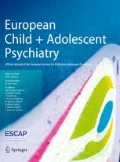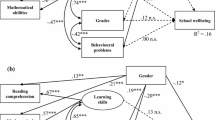Abstract
Aim
In Africa, little is known about child mental health. This study piloted the Strengths and Difficulties Questionnaire (SDQ) in Kinshasa, investigated mental health problems and the association between these problems and school performance, demographic factors, illness and nutrition.
Methods
An epidemiological survey was conducted with 1,187 children, 7–9 years old, recruited from randomly selected schools. Mental health problems were assessed with the SDQ (a behavioural screening tool) administered to teachers. Stability of the factor structure was examined using principal component factor analysis of the SDQ items. The reliability was evaluated using measures of internal consistency of the SDQ scales.
Results
Factor analysis yielded five factors, similar to the published SDQ scales. The internal consistency was satisfactory on all of the SDQ scales. Using the 90th percentile, the cut-off scores were somewhat higher than the published cut-off scores in this younger sample. Poor nutrition, low socioeconomic status and illness were found to increase the risk for mental health problems and low school performance.
Conclusion
SDQ may be considered useful to describe mental health problems among urban African children in Kinshasa. An association between mental health, school performance, demographic factors, illness and nutrition was found.
Similar content being viewed by others
References
Ashenafi Y, Kebede D, Desta M, Alem A (2001) Prevalence of mental and behavioural disorders in Ethiopian children. East Afr Med J 78:308–311
Cury CR, Golfeto JH (2003) Strengths and Difficulties Questionnaire (SDQ): a study of school children in Ribeirão Preto. Revista Brasileira Psiquiatria 25:139–145
Gillberg C (1998) Hyperactivity, inattention and motor control problems: prevalence, comorbidity and background factors. Folia Phoniatrica Logopaedica 50:107–117
Goodman R (1997) The Strengths and Difficulties Questionnaire: a research note. J Child Psychol Psychiatry 38:581–586
Goodman R (2001) Psychometric properties of the Strengths and Difficulties Questionnaire. J Am Acad Child Adolesc Psychiatry 40:1337–1345
Goodman R, Ford T, Simmons H, Gatward R, Meltzer H (2000) Using the Strengths and Difficulties Questionnaire (SDQ) to screen for child psychiatric disorders in a community sample. Br J Psychiatry 177:534–539
Goodman R, Scott S (1999) Comparing the Strengths and Difficulties Questionnaire and the Child Behavior Checklist: is small beautiful? J Abnorm Child Psychol 27:17–24
Harel EH, Brown WD (2003) Attention deficit hyperactivity disorder in elementary school children in Rhode Island: associated psychosocial factors and medications used. J Clin Pediatr (Phila) 42:497–503
Liang H, Flisher AJ, Chalton DO (2002) Mental and physical health of out of school children in a South African township. Eur Child Adolesc Psychiatry 11:257–260
Malhotra S, Kohli A, Arun P (2002) Prevalence of psychiatric disorders in school children in Chandigarh, India. Indian J Med Res 116:21–28
Meltzer H, Gatward R, Goodman R, Ford T (2000) Mental health of children and adolescents in Great Britain. Office for National Statistics. London
Ministère de l’Education Nationale (1999) Education pour tous, bilan à l’an 2000. Ministère de l’Education Nationale, Kinshasa
Mullick MS, Goodman R (2001) Questionnaire screening for mental health problems in Bangladeshi children: a preliminary study. Soc Psychiatry Psychiatr Epidemiol 36:94–99
Muris P, Meesters C, Van Den Berg F (2003) The Strengths and Difficulties Questionnaire (SDQ) Further evidence for its reliability and validity in a community sample of Dutch children and adolescents. Eur Child Adolesc Psychiatry 12:1–8
Smedje H, Broman JE, Hetta J, von Knorring AL (1999) Psychometric properties of a Swedish version of the “Strengths and Difficulties Questionnaire”. Eur Child Adolesc Psychiatry 8:63–70
Tadesse B, Kebede D, Tegegne T, Alem A (1999) Childhood behavioural disorders in Ambo district,western Ethiopia. I. Prevalence estimates. Acta Psychiatr Scand 397(Suppl):92–97
WHO (2001) The World Health Report 2: Mental Health: new understanding, new hope. World Health Organisation, Geneva
Wilens TE, Biederman J, Spencer TJ (2002) Attention Deficit/Hyperactivity Disorder across the Lifespan. Annu Rev Med 53:113–131
Wolraich ML, Lambert EW, Baumgaertel A, Garcia-Tornel S, Feurer ID, Bickman L, et al. (2003) Teachers’ screening for attention deficit/hyperactivity disorder: comparing multinational samples on teacher ratings of ADHD. J Abnorm Child Psychol 31:445–455
www.unicef.org/statis/0. Democratic Republic of Congo. In; 2002
Author information
Authors and Affiliations
Corresponding author
Rights and permissions
About this article
Cite this article
Kashala, E., Elgen, I., Sommerfelt, K. et al. Teacher ratings of mental health among school children in Kinshasa, Democratic Republic of Congo. Europ.Child & Adolescent Psych 14, 208–215 (2005). https://doi.org/10.1007/s00787-005-0446-y
Accepted:
Issue Date:
DOI: https://doi.org/10.1007/s00787-005-0446-y




